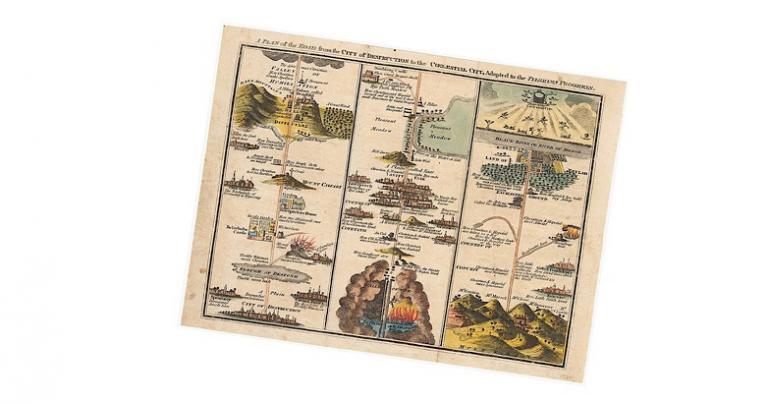 Narnia. Middle Earth. Prydain. Over Sea and Under Stone.
Narnia. Middle Earth. Prydain. Over Sea and Under Stone.
I loved them all as a boy, but except for Narnia, I read nothing as often as Pilgrim’s Progress. A good Saturday was spent mapping out the journey of Christiana and her children heading to the Celestial City. Just as Nancy Drew was much better than the Hardy Boys, so Christiana and her adventures were more excellent than the original with Christian.
In this, I was in the global minority as our trusty guide Karen Swallow Prior notes:
Bunyan published a second part of the story in 1684, which narrates the pilgrimage of the family Christian left behind on his journey in the first part, but the second part was never as successful or as beloved as the first.
Some hate the obvious analogy . . . Meet Faithful and he will be faithful. . . But I did not mind. For one thing, the truth was obvious enough that ten year old me could get it, seventeen year old me could find more, and fifty-five year old me can get that there is more to get.
Pilgrim’s Progress is a delightful sermon by a common Christian with uncommon insight. Too much John Bunyan might be bad for a man, but we are (mostly) in no danger of the overly rigorous Puritanism of his time. For those who are tempted to ban Christmas, go read some C.S. Lewis. For those of us tempted to think the Way is wide and many there be that find it, a dose of Bunyan is good balance.
Chastity is the virtue nobody wants, but everyone needs. Diligence is the virtue everyone wants, but few get. Chastity looks terrible and ends beautifully. Diligence is obviously good, but at any give moment seems unnecessary.
I don’t have to workout today. I really do not. After a few todays, I am rotund. Diligence is unnecessary in the moment, but necessary overall and so slips away from us.
Karen Swallow Prior wishes to help. She points to Pilgrim’s Progress as a training in diligence and this is surely true since there is no great book more morally rigorous. Bunyan is diligent.
Of course, at times, Puritans when banning Christmas or being regicidal sons of bitches are diligent in bad causes. KSP concedes the limits to this virtue:
Persistence in planning a robbery or harassing strangers on the internet isn’t a virtue any more than loyalty is virtuous when it’s given to a mobster or a Klansman.
One can endure to the end and be damned if one joins the Klan. God help the Klansman to go to the sloth and consider his ways and do nothing.
On Sloth
KSP, our guide, notes that sloth is the opposite of diligence and so seeing what is not diligence is helpful in finding what is:
Sloth involves not only a lack of effort but also a lack of care. In fact, the Greek word for sloth, acedia, literally means “without care” or “careless.”
KSP compares it to apathy, but it is more than that. Apathy is acedia, but acedia is more. Some kids cannot be bothered to make their beds, they are apathetic. Other younglings will not make their beds, because: “Come on. No. Bed. Making.” That is also acedia, but much worse.
KSP is right that many slothful people are:
without appetite or desire.
Others are with a great desire to have nothing, no experience, no turmoil. Nothing. This is the man who goes to his bedroom and stays there. He does as little as possible. In a broken world, the not-doing, no risk, no people strategy can be an active one. You can design a life (today) even if you are not rich that will allow you to minimize appetite and desire.
This is the advice of Epicurus: minimize the chances of pain.
KSP is right to point out that slothful people can also be very, very busy. We are just not busy in the work of heaven. The slothful man builds towers, but not himself.
Sloth stops us from seeking God, and that means we do not find him.” 4 Paradoxically, then, the busiest people can be the most slothful. Frenetic activity can be what most effectively keeps us from what we are supposed to be doing, particularly seeking God and his righteousness. Being busy is easier than being good. This is why sloth’s being “a sin of omission, not commission,” by one way of thinking, “makes it deadlier.”
Busy work is sloth for the tricksy man. Fill out the form, do the study, sit on the committee, and we can do nothing while seeming to do something. The modern University is a tricksy sloth: one sits on committees making much ado about doing nothing.
Bunyan’s Biography
Bunyan managed to be wrong about almost every political cause, while being better than his politics. Bunyan sided with the arch-tyrant Oliver Cromwell, who was happy to kill his foes and crush the rights of Englishman. When Bunyan’s bad cause lost, he was jailed, but pardoned by a King he loathed. Thank God. As a result of his failure, we got the best of Bunyan, which is better than most of us will ever be!
We can thank God that the Bible was more important to Bunyan than his (fairly) lunatic politics and public theology. Bunyan endured to the end and was saved, despite himself:
Bunyan’s life attests to his belief that diligence is necessary to a virtuous life but is insufficient apart from the work of Christ. This is also the message of Pilgrim’s Progress.
Christians thank God Bunyan’s politics failed while being right glad we can read his books. Imagine supporting a tyrannical man just so that one could get a “win!”
Bunyan was an idiot in his public life and a saint in is literary life. He endured to the end and was saved anyway!
Bunyan was (almost) entirely wrong in practical terms and we can be thankful he did not prevail, yet his powerlessness was his salvation. Writing in his prison, he was left (mostly) with what he got right. He had no power, so no temptation to use power. He could reject the vanity of the age without having the ability to impose his particular vanities on the rest of England.
The hardest mission is that of blessed Constantine, creating a culture that lasts thousands of years. Having won, Constantine’s errors as well as his legacy endure. Critics can pretend they could have had the good without the bad. Constantine endures, but without the purification of martyrdom.
Cromwell shows us how hard it is to be Constantine. The Reformed school copy Cromwell created a bloody mess than could not survive a generation. Constantine’s vision lasted one thousand years while Cromwell’s could not survive his son: tumbledown Dick.
Bunyan’s blessing was to be kept from power. As a result, he could write and we can safely ignore his narrowness for his piety. Bunyan is a Christian and his Christianity saves him from his Puritanism.
Yet one cannot always hide from power. If one is born king, one must do as one can. Bunyan is a reminder not to hope for such a result. He endured and his endurance produced genius.
A Taste for Allegory
Allegory: Tolkien famously hated it and some Çhristians see it in any text (“Look a Christ image!”). KSP explains what the term means:
In simple terms, an allegory is a story that is symbolic. Allegory doesn’t just contain symbols, as many literary works do, but it is wholly symbolic. Allegory works on two levels, the literal and the symbolic.
Pilgrim’s Progress is the best example of an extended allegory in English. I have always thought of an allegory as a literary icon: a symbol made with words. As KSP says “an allegory, like all stories, shows rather than tells.” The painted icon in the Orthodox Church is often said to be “written” because every element in the icon contains meaning, including the interaction of the elements!
Allegory was icon writing for iconoclasts in the Puritan community:
Despite being iconoclasts who eschewed graven images, the Puritans inherited from the medieval worldview “mental habits of conceiving abstractions pictorially.
KSP sees the need for diligence on the part of the reader in an extended allegory like Pilgrim’s Progress. She argues:
Allegory depends on a thick understanding of the physical world and the language that bridges that world with the spiritual one. Whereas the modern fiction writer creates out of her imagination, the premodern allegorist translated from the book of nature.
This premodern understanding meant that many ancients right up to the time of Bunyan saw divine significance in everything. When animals behaved in certain ways, that became a lesson to humankind who could observe what “is” in the “book of nature” and wonder what God was saying to humanity. We are, after all, charged to go to the ant and consider his ways!
When I was a boy we sang an old hymn that declared “This is my Father’s world and to my listening ears all nature sings and round me rings the music of the spheres. . .” I hear God most clearly in the Words of Scripture and see God best in life of his people (God have mercy on me a sinner!), but nature also is an allegory of the Divine and a song of praise.
Light pollution is a crime that defrauds us of the heavens that declare the glory of God.
Living a rich life where all around is charged with meaning will make a person hesitant to pollute or destroy nature. He learns and pauses, because there is a Divine purpose for each ecosystem and there might be a lesson for the children of God as well. Of course, this sense of meaning in nature can degenerate into superstitution. I knew a woman apt to see God in every movement of her German shepherd.
Yet there I have often wondered if there wasn’t less harm in her madcap love of God and her puppy, than in the scientist who sees only a subject for vivisection in the dog.
The Puritan Work Ethic
KSP is a writer who can do several things at once herself. While helping us inhabit texts thoughtfully, carefully, even morally, she draws out several concerns. One is that the American Dream has positive and negative aspects. One aspect of this dream has been a “Protestant Work Ethic” that was born in the era of Bunyan. KSP writes:
The doctrines of the Protestant Reformation—and later, Puritanism—contributed significantly to the idea that individuals can progress beyond their given condition, whether that condition is spiritual, social, or economic. The Puritan (or Protestant) work ethic is the indirect offspring of a doctrinal emphasis on the role of the individual in his or her own salvation, sanctification, and Scripture reading. The work ethic both depends on and cultivates the careful attentiveness and desire at the heart of diligence.
I am not naturally attracted to all things Puritan and it is always good for me to read Bunyan, the Mayflower Compact, and other writings to remember how good, true, and beautiful much of Puritanism is.
The idea of progress can be abused, but that we can move forward in sanctification, becoming more like God, is good. Even the idea that all God’s children should be diligent in their daily life is also important. If this could be misunderstood by New England merchants as a justification for acquisitiveness, this was just our natural human tendency to make every virtue into a vice. Rising prosperity and a decline in poverty globally is partially the result of the spread of the Puritan work ethic.
Sadly, we have often decoupled that ethic from a “thick view” of nature. As a result, we are too diligent at our immediate business and not thoughtful enough about creation. Again, this abuse need not cause us to forget the good that has come from diligence in human affairs.
If we could couple growing sanctification in progress to paradise with hard work in our stewardship of creation, we might do well by doing good in this life and that which is to come. We are so heavenly minded, we do earthly good.
Buy the book.
————————————-
This will be a twelve part series: Introduction, Prudence, Temperance, Justice, Courage, Faith, Hope, Love, Chastity, Diligence,












